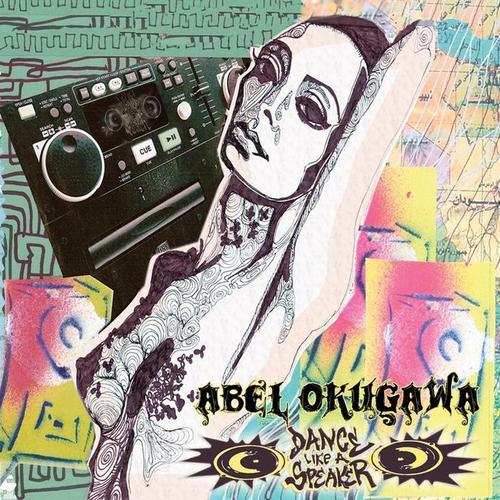
Dance Like a Speaker
ABEL OKUGAWA
Dance Like A Speaker
Within the accompanying CD booklet of Abel Okugawa’s Dance Like A Speaker, you’ll find a figure walking the streets with a speaker for a head. Are they a physical manifestation of the beats running through the artist’s own mind, dark and cavernous, the subwoofer of the subconscious vibrating with rhythms that hypnotize and cause involuntary head nods? Nestled away in the confines of the Monkeyclaus recording studios of Roseland, Virginia, Okugawa wears the hat of sonic sorcerer, conjuring up spells with healthy doses of dub, hip-hop, and electronic music with cosmic sensibilities. If you are one of the lucky few to get your hands on the limited edition CD, you’re immediately struck by the screen print cover art, both visually appealing and curiously tangible. However, in a contemporary society that places importance on style before substance, perhaps one’s left to wonder if the music within matches the beauty of the packaging. Have no fear: with Okugawa behind the mixing board, you are in good hands.
Right from the album’s opening track, “Subtle,” you’re caught between the sensitive interplay of the rough and the smooth. Waves of harmonic chords wash over the drum programming, assertive in its approach while still open to suggestions. “Need UR Love” seamlessly weaves an audio bed for bedrooms worldwide, the loping percussion falling victim to the seductive soul loops above it. “Peal” is wonderfully ethereal with a simplistic rhythm pattern, leaving room for a bass line from outer space to be sprinkled liberally, but never overpowers the track. It’s obvious that Okugawa knows the sounds in his aural spice rack intimately and is able to create beat dishes that burst with flavor. A handful of musicians provide their own well-placed seasoning, be it the guitar and bass work of Raphael Wintersberger or the immediately comforting tablas of Loren Oppenheimer.
Okugawa’s music is somewhat reminiscent of Tricky’s previous material, but there’s a glaring difference that’s worth mentioning. Rarely will Adrian Thaws leave his production without his distinct Bristol rasp spouting stream of consciousness lyrics. Outside of the dulcet tones of vocalist Rahimah von Briesen (whose singing can be regarded as another instrument within this album’s context), Okugawa’s brand of subterranean abstract blues stands on its own beats. Selections such as “Mr. Moba” and “Roses” serve as evidence. When words are needed, nothing is left to chance. Featured artists Regime Change spit plain and bitter truths that act as the perfect accompaniment to Okugawa’s instrumentals. The stark boom bap of “Fo Sho” is accentuated by orchestra swells and disciplined poetic waxing that praises motherhood and shines light on societal injustice. Such bittersweet ruminations continue on “Reparations,” cushioned by inviting musical tones and rhythms inspired by the motherland.
Abel Okugawa has created a work of bold color and infectious melody. To miss Dance Like A Speaker is to miss a life-affirming soundtrack.
